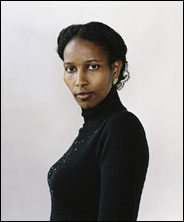 The New York Times, which I have pretty much written off, every now and then prints something extraordinary. This Sunday, it printed a portrait of Dutch parliamentarian Hirsi Ali.
The New York Times, which I have pretty much written off, every now and then prints something extraordinary. This Sunday, it printed a portrait of Dutch parliamentarian Hirsi Ali.
Threatened with death, she has round-the-clock protection, à la Salman Rushdie. This excerpt gives the flavor both of her situation and her extraordinary personality:
She had also announced that she was no longer a believing Muslim. The punishment for such apostasy is, according to strict interpretations of Islam, death. That day at the Dudok, several dozen vocational students were taking up the main restaurant, so she and her guards parked at two tables near the bar. Hirsi Ali had her back to the restaurant when one of the students, apparently a Dutch convert to Islam, tapped her on the shoulder. ''I turned around,'' she recalls in her elegant English, ''and saw this sweet, young Dutch guy, about 24 years old. With freckles! And he was like, 'Madam, I hope the mujahedeen get you and kill you.' '' Hirsi Ali handed him her knife and told him, ''Why don't you do it yourself?''
Holland, like much of Europe, is faced with the question of whether it should become a plural society, with Muslims having their own rules, including strict male control of women, polygyny, and "honor" killings, or whether it should impose standards for which its left, sunk in cultural relativism and secularism, can find no principled basis. Although events such as the assassination of filmmaker and iconoclast Theo Van Gogh have led to some reaction, low birth rates, secularism, and lack of conviction provide a basis for believing that Europeans are on the way to becoming dhimmis in their own countries.
Hirsi Ali's extraordinary personality and saga well illustrate the choices Europe faces.
Hat tip: Little Green Footballs.

No comments:
Post a Comment